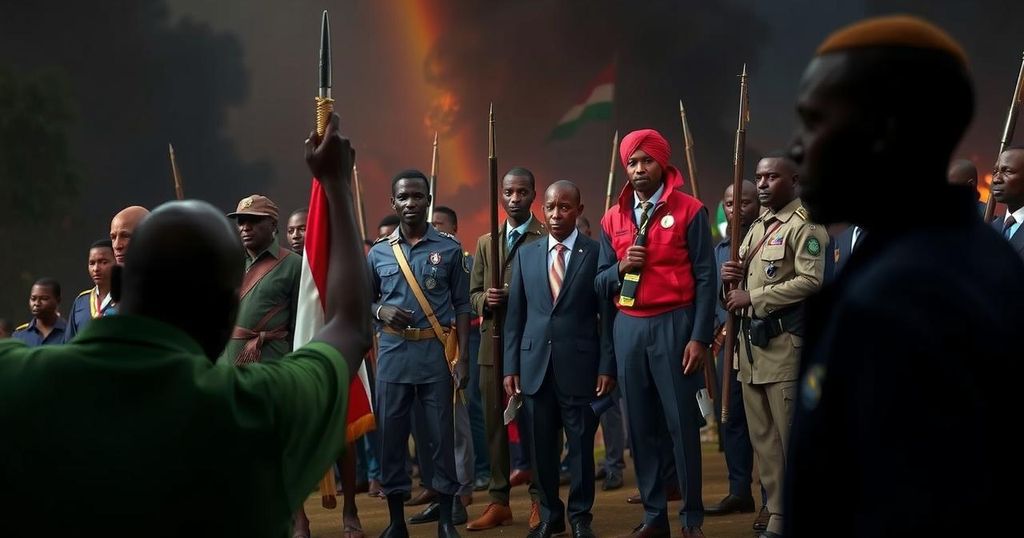Russia Vetoes UN Resolution for Ceasefire in Sudan, Sparking Outrage

Russia has vetoed a UN resolution for a ceasefire in Sudan, which faced condemnation from the UK and US as a significant setback amid escalating humanitarian crises. The conflict, which has lasted 19 months, has resulted in vast displacement and significant loss of life, prompting urgent calls for peace. The veto illustrates the geopolitical complexities surrounding interventions in Sudanese affairs, amidst accusations of foreign meddling.
The United Nations Security Council witnessed heated exchanges following Russia’s veto of a resolution proposed by the UK and Sierra Leone that aimed to establish a ceasefire in Sudan amidst an ongoing civil war. The UK condemned the veto as a “disgrace,” emphasizing the dire humanitarian crisis, while Russia defended its action by claiming that the resolution ignored Sudanese sovereignty and was an attempt for Western nations to intervene in the country’s affairs. The civil conflict in Sudan, which has lasted for over 19 months, has resulted in significant loss of life, displacement of millions, and a catastrophic humanitarian situation. Activists have criticized the UN for its inadequate response to the ongoing turmoil.
The resolution aimed to compel both military and paramilitary groups to cease hostilities and engage in dialogue for a potential national ceasefire, yet it was met with resistance from Russia. The Sudanese UN representative highlighted omitted clauses crucial for condemning foreign support of the Rapid Support Forces (RSF), further complicating diplomatic efforts. The ongoing violence has resulted in severe human rights abuses, prompting entities like the UN to grapple with complex geopolitical and ethical questions surrounding their interventions.
In April 2022, violence erupted in Sudan as the army clashed with the RSF, marking a notable escalation of power struggles that exacerbated pre-existing tensions. Despite passing votes from 14 out of 15 Security Council members, the veto by Russia halted any immediate resolution to the conflict. Calls for action from the US and UK reflect the international community’s increasing concern about the humanitarian crisis, underlining the mixed loyalties and political maneuvering in the region.
The significant implications of this diplomatic fallout resonate across global discussions regarding humanitarian intervention and the role of powerful nations in conflicts. The war’s toll has raised alarms about the need for a united global effort to address not only the ceasefire but also the underlying issues that fuel such devastating conflicts.
Ultimately, the UN Security Council’s inability to pass the resolution due to Russia’s veto underscores the complexities involved in international peacekeeping efforts. The humanitarian crisis in Sudan remains a pressing issue that necessitates a cooperative and holistic approach to foster peace and stability in the region.
This situation poses a stark reminder of the ongoing struggles faced by civilians amid geopolitical contests and brings to light the urgent need to reassess international strategies aimed at resolving such conflicts in a manner that prioritizes human lives and dignity.
The civil war in Sudan has been raging for 19 months, leading to widespread violence, displacement, and humanitarian disasters. The conflict initiated in April 2022, stemming from a power struggle between the Sudanese army and the Rapid Support Forces (RSF), has created one of the world’s worst humanitarian crises. The UN’s involvement reflects a broader international concern over the active human rights violations occurring amidst the conflict, as various parties aim to mediate peace. However, the complexities of sovereign rights, foreign influence, and the politicization of aid complicate the resolution process.
In summary, the recent UN Security Council stalemate highlights the intricate challenges of international diplomacy in conflict resolution. Russia’s veto of the ceasefire resolution underscores the geopolitical tensions that can hinder humanitarian efforts in crisis zones like Sudan. While international calls for urgent action continue, the pathway to peace remains obstructed by both domestic and foreign political agendas, emphasizing the need for a concerted global approach to address the dire humanitarian situation and establish lasting peace in Sudan.
Original Source: www.bbc.co.uk







